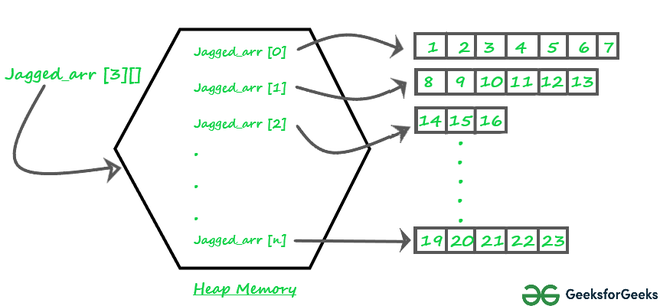Java中的锯齿状数组
先决条件: Java中的数组
锯齿状数组是数组的数组,其成员数组可以有不同的大小,也就是说,我们可以创建一个二维数组,但每行的列数是可变的。这些类型的数组也称为锯齿状数组。
内存中锯齿状数组的图示:

锯齿状数组
锯齿状数组的声明和初始化:
Syntax: data_type array_name[][] = new data_type[n][]; //n: no. of rows
array_name[] = new data_type[n1] //n1= no. of columns in row-1
array_name[] = new data_type[n2] //n2= no. of columns in row-2
array_name[] = new data_type[n3] //n3= no. of columns in row-3
.
.
.
array_name[] = new data_type[nk] //nk=no. of columns in row-n另一种初始化锯齿状数组的方法:
int arr_name[][] = new int[][] {
new int[] {10, 20, 30 ,40},
new int[] {50, 60, 70, 80, 90, 100},
new int[] {110, 120}
};
OR
int[][] arr_name = {
new int[] {10, 20, 30 ,40},
new int[] {50, 60, 70, 80, 90, 100},
new int[] {110, 120}
};
OR
int[][] arr_name = {
{10, 20, 30 ,40},
{50, 60, 70, 80, 90, 100},
{110, 120}
};以下是演示上述概念的Java程序。
Java
// Program to demonstrate 2-D jagged array in Java
class Main {
public static void main(String[] args)
{
// Declaring 2-D array with 2 rows
int arr[][] = new int[2][];
// Making the above array Jagged
// First row has 3 columns
arr[0] = new int[3];
// Second row has 2 columns
arr[1] = new int[2];
// Initializing array
int count = 0;
for (int i = 0; i < arr.length; i++)
for (int j = 0; j < arr[i].length; j++)
arr[i][j] = count++;
// Displaying the values of 2D Jagged array
System.out.println("Contents of 2D Jagged Array");
for (int i = 0; i < arr.length; i++) {
for (int j = 0; j < arr[i].length; j++)
System.out.print(arr[i][j] + " ");
System.out.println();
}
}
}Java
// Another Java program to demonstrate 2-D jagged
// array such that first row has 1 element, second
// row has two elements and so on.
class Main {
public static void main(String[] args)
{
int r = 5;
// Declaring 2-D array with 5 rows
int arr[][] = new int[r][];
// Creating a 2D array such that first row
// has 1 element, second row has two
// elements and so on.
for (int i = 0; i < arr.length; i++)
arr[i] = new int[i + 1];
// Initializing array
int count = 0;
for (int i = 0; i < arr.length; i++)
for (int j = 0; j < arr[i].length; j++)
arr[i][j] = count++;
// Displaying the values of 2D Jagged array
System.out.println("Contents of 2D Jagged Array");
for (int i = 0; i < arr.length; i++) {
for (int j = 0; j < arr[i].length; j++)
System.out.print(arr[i][j] + " ");
System.out.println();
}
}
}输出
Contents of 2D Jagged Array
0 1 2
3 4 以下是第 i 行有 i 列的另一个示例,即第一行有 1 个元素,第二行有两个元素,依此类推。
Java
// Another Java program to demonstrate 2-D jagged
// array such that first row has 1 element, second
// row has two elements and so on.
class Main {
public static void main(String[] args)
{
int r = 5;
// Declaring 2-D array with 5 rows
int arr[][] = new int[r][];
// Creating a 2D array such that first row
// has 1 element, second row has two
// elements and so on.
for (int i = 0; i < arr.length; i++)
arr[i] = new int[i + 1];
// Initializing array
int count = 0;
for (int i = 0; i < arr.length; i++)
for (int j = 0; j < arr[i].length; j++)
arr[i][j] = count++;
// Displaying the values of 2D Jagged array
System.out.println("Contents of 2D Jagged Array");
for (int i = 0; i < arr.length; i++) {
for (int j = 0; j < arr[i].length; j++)
System.out.print(arr[i][j] + " ");
System.out.println();
}
}
}
输出
Contents of 2D Jagged Array
0
1 2
3 4 5
6 7 8 9
10 11 12 13 14